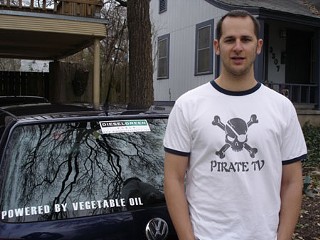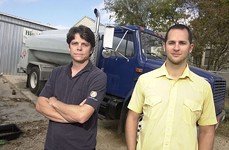Biodiesel Industry Fumes Over State's Heavy Hand
Texas environmental regulators come down hard on fledgling biodiesel industry
By Daniel Mottola, Fri., March 14, 2008
Has the Texas Commission on Environmental Quality finally found an industry it doesn't like?
The entrepreneurs who built Texas' biodiesel industry believe so. They began feeling the heat Jan. 1, when the TCEQ imposed the most complex and specific emissions-related standards in the nation on popular blends of biodiesel and petroleum diesel. The new rules, which preceded action by the federal government and even air-quality-obsessed California, rendered many blends either illegal or economically unviable for local retailers. Austin-area suppliers view the TCEQ's actions as a hypocritical counterattack on a fledgling industry in an oil-dominated energy world – especially after the agency largely ignored air-quality consequences in rubber-stamping permits for five new coal power plants since 2005.
At issue is the TCEQ's Texas Low Emission Diesel rule, or TxLED. It was introduced in 2005 to limit nitrogen oxide (NOx) emissions, a central ingredient in smog pollution in 110 counties (including Travis). The rule requires that biodiesel/petrol diesel blends emit no more NOx than TxLED-approved diesel (a slightly cleaner burning formulation of regular diesel).
To market blends legally, producers must fund costly testing at accredited labs – using standards they say are antiquated – to demonstrate NOx reductions. Since 2005, the TCEQ has twice delayed TxLED's compliance deadline for the biodiesel industry, while studies by the EPA and the Department of Energy have reached conflicting conclusions on biodiesel and NOx.
"There is quite a bit of evidence that biodiesel does increase NOx," said Morris Brown, a TCEQ technical specialist for the TxLED program. "To the TCEQ, this is an air-quality issue versus a renewable-fuel issue." Two biodiesel blends have met TxLED approval – a B20 blend (20% biodiesel, 80% petrol diesel) that employs a chemical additive to reduce NOx and a B5/TxLED diesel blend.
For retailers, such as locally owned Signature Austin Shell stations (which partnered with Austin Biofuels in 2006 to offer B20 at 31 stations), the cost was too high, and Signature sells only a B5 blend. Austin Biofuels and DieselGreen Fuels have focused on selling high blends like B99. A 50 cent-$1 IRS blending rebate helped them offer competitive pricing, but no B99 additive has yet been approved by the TCEQ. Local indie suppliers are doubtful they can turn a profit using an additive and are uncertain customers will pay nearly $5 per gallon for pure biodiesel without the IRS credit.
"I'm now in a desperate bid to save my business," said Jason Burroughs, DieselGreen's managing partner. "The whole TxLED issue is a comedy of errors. ... Biodiesel use has been mandated by Congress, meanwhile TCEQ is handcuffing us." He argued that TCEQ test criteria simulates unrealistic engine loads, which result in more NOx, and that emissions features in newer vehicles nullify supposed NOx increases. Burroughs recently decided to sell a B99.99 blend as B100 (pure biodiesel), supported by a written opinion he solicited from the comptroller's office – a move that could prove pivotal for the statewide industry. B99.99 still qualifies for the IRS blending credit, although he contends that its composition doesn't differ fundamentally from B100 as far as the TCEQ is concerned.
Jeff Plowman, co-founder of Austin Biofuels and treasurer of the Biodiesel Coalition of Texas, said the group is in "shock and disarray" over the TxLED rule. Skyrocketing costs for common feedstocks like soybean and cottonseed oil have also impacted the industry causing at least three of Texas' 10 plants to halt production, shrinking supplies. And Plowman stressed that the federal government didn't direct the TCEQ to include biodiesel in its diesel regulations.
Pressed to explain the biodiesel rule's origin, Brown said the decision "fell under the purview of the executive director's office and the office of the chief engineer." Concerns that policies from TCEQ Executive Director Glenn Shankle's office are more political than scientific are nothing new. Last year, Shankle issued an unusual memo actually arguing against his staff that more, not less, NOx emissions should be permitted from the Oak Grove power plant, which is expected to be among the dirtiest power plants in the U.S. "It's very disappointing that the TCEQ is targeting such a niche industry while giving a pass to coal plants," Burroughs said. Plowman noted that in-state biodiesel sales last year totaled 20 million gallons, compared to 13 billion gallons of petrol diesel sold.
Bob Okamoto, an air-pollution specialist for the California Air Resources Board, said California doesn't currently regulate biodiesel NOx emissions but that the state agency is beginning an expansive study to quantify biodiesel's emissions compared to California's state-mandated ultra-low-emissions petroleum diesel formula. Okamoto agreed that previous tests yielded "conflicting data" on NOx.
Earlier this month, Gov. Rick Perry awarded a $4 million grant to a Texas A&M-related program to develop algae-based biodiesel, something the city of Austin has also expressed interest in. "If there's no first generation of biodiesel to prove the concept, there will be no second generation to test its sustainability," Burroughs said, referring to the development of new feedstocks that don't compete with cooking oils or encourage tropical deforestation like the palm-oil-based biodiesel sold widely in Europe. "No one will make the first generation of algae biofuels if there's no market for biodiesel today," he said. (For more on local biodiesel, see www.dieselgreenfuels.com and www.austinbiofuels.com.)
Got something to say on the subject? Send a letter to the editor.











